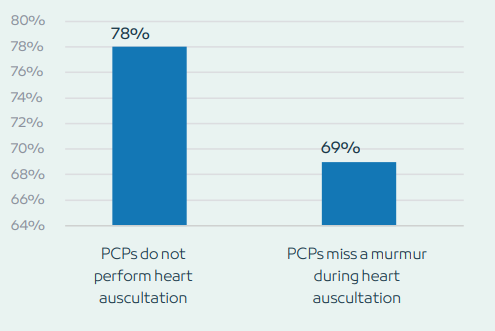
Introduction
Valvular heart disease (VHD) poses a significant health threat to Saudi Arabia’s ageing population. Aortic stenosis, the most common form of VHD, is particularly prevalent among those over 60. Approximately 20,000 people over the age of 65 are estimated to live with symptoms of severe aortic stenosis in Saudi Arabia. Despite available treatments, many patients remain undiagnosed and untreated. Failing to address VHD results in severe and costly challenges. The impact of VHD is projected to increase in Saudi’s ageing population.
Understanding Valvular Heart Disease in Saudi Arabia
Valvular heart disease significantly impacts older adults, with aortic stenosis being the most common form. Risk factors include age, smoking, hypertension, and elevated cholesterol levels. There is a high mortality rate for these patients within two years if severe symptomatic aortic stenosis remains untreated. In Saudi Arabia, 2-7% of people over 60 are estimated to have aortic stenosis. However, diagnosis rates are alarmingly low, leading to severe health complications and increased healthcare costs.
Barriers to Optimal Care
Several barriers prevent effective VHD care in Saudi Arabia. These include:
- Lack of Awareness: Both the public and healthcare professionals (HCPs) often misattribute VHD symptoms to natural ageing.
- Inadequate Training: Primary care physicians (PCPs) may not be equipped to detect VHD through simple auscultation.
- Limited Research: Insufficient local data on VHD prevalence hampers effective policy-making and resource allocation.

are connected with PCPs
Actions for Policy-Makers
Policy-makers play a crucial role in addressing these barriers. The need to prioritise raising public awareness about VHD symptoms and encouraging regular check-ups. Implementing dedicated screening programs as part of healthy ageing initiatives should also be encouraged by policymakers. They also need to be responsible for ensuring well-trained interventional cardiologists and cardiac surgeons are available for treating VHD patients.
Actions for Health Systems and HCPs
Healthcare systems and professionals must also take proactive steps. They need to ensure adequate training of PCPs to effectively examine and detect VHD, specifically aortic stenosis. Physicians need to be encouraging routine screening for VHD in primary care for those over 60. This will assist with reducing the numbers of undetected aortic stenosis in the Saudi population. Establishing clear referral pathways for patients diagnosed with VHD is crucial to ensure timely care by the specialists and physicians.
Priority Areas for Research
Research is another essential aspect to inform health policies and improve VHD care. Priority areas include gathering data on the epidemiology of VHD in Saudi Arabia. There is currently a global under-reporting of VHDs which leads to lack of public recognition and insufficient prioritisation within healthcare. Funding local studies on VHD will not only assist with local treatment guidelines but also to guide health policy development. We can also use local research to evaluate the outcomes of strategies that intervene in VHD.
Improving Disease Management
Effective disease management requires a coordinated approach. Each health system level needs a well-defined workforce plan to guarantee the availability of necessary skills and resources. Leveraging digital platforms for regular patient follow-ups and improved care coordination will enable accelerated access to care. Implementing integrated, multidisciplinary care teams to provide comprehensive VHD care will ensure well rounded care.
Conclusion
Addressing valvular heart disease in Saudi Arabia is essential for improving the health of the ageing population. A five-fold increase in aortic stenosis is expected by 2050 in Saudi Arabia. By raising awareness, enhancing detection, and providing timely treatment, we can mitigate the impact of VHD. This aligns with Saudi Vision 2030’s goal of creating a healthier society. Investing in better VHD care will save costs in the long run and improve the quality of life for many older adults.
